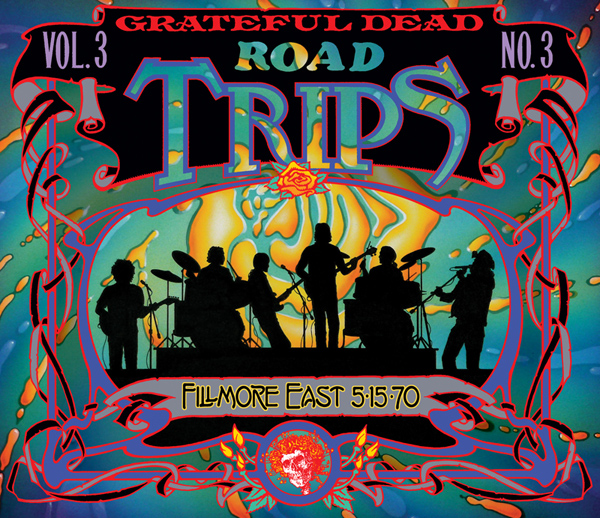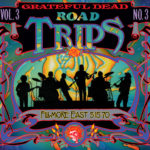
self-released
In the spring of 1970, the Grateful Dead would often play an early show, featuring an acoustic set, followed by an appearance by the New Riders of the Purple Sage, a collaborative collective occasionally including Jerry Garcia on pedal steel guitar, and then followed by an electric Dead set. If that wasn’t enough, Fillmore East (and West, for that matter) owner/promoter Bill Graham often had the Dead and NRPS playing again, in a late show during the evening.
On May 15, 1970—recording date of the new edition of the Dead’s Road Trips series—the band was in the midst of their Workingman’s Dead / American Beauty era, which spawned a legion of classic material featuring some of their most dialed-back acoustic playing, pensive musings, and, of course, the true golden dawn of the timeless Jerry Garcia/Robert Hunter songwriting era. The duo were pulling away from 1960s spaced-out utopian weirdo ideals, and reflecting on the beleaguered, the downtrodden and the underdog on the outskirts of society, as if the twin song sorcerers—one conjuring sweet music embedded within the textures of the Americana Majestic; the other, wrapping his words of seasoned wisdom around and inside the notes—knew exactly who they were speaking about, and subconsciously knew the impact of their art.
One can hear generations of Deadheads spawned with these 1970s songs. But in New York, it is the combination of originals, covers, and Pigpen blues classics, which create the fabric of the Grateful Dead mythology. At the Fillmore East, that early awakening of the Dead ruminative catalogue is in full bloom, of course, but it is also the other eclectic textures, which serve to enhance that story, as well. Sturdy, invigorating acoustic renditions of “Don’t Ease Me In” (crackerjack tight), “I Know You Rider” (cinematic), “Ain’t It Crazy (The Rub)” (delightfully Pig nasty), “Long Black Limousine” (Weir as Presley, and a true beaut of a performance, to boot) “Deep Elem Blues” (a fine view of the darkness on the inner edge of town), “The Ballad of Casey Jones” (a rarely played cover), and twin bluegrass gems “A Voice From On High” and “Cold Jordan” (elegant and holy, featuring NRPS’s David Nelson and John “Marmaduke” Dawson) are joined by the electric Dead in its continuing twin mission of homegrown inner mediations and psychedelic space adventures.
And it is on the electric material, specifically tumultuous versions of the complete “That’s It for the Other One” suite, “China Cat Sunflower>I Know You Rider,” “Hard to Handle,” and “Morning Dew,” where that acoustic counterpunch has its resonance. The harder side of the Dead, gliding and spinning, rolling and cascading, notes slammed and pushed forward, vocals tethered to tangible hooks, comes through and serves as a weighty companion to the prior-played sensitive and ethereal material. The Grateful Dead being who they were and still very much are on these rich recordings—which seem to carry one far away towards some beautiful magical land where time has no meaning, and space, even less in its original context—truly soar on an extraordinary sequence, which includes a patient and mind-expanding “Dark Star,” that goes off course, soars, floats on the back of gangly and measured Garcia-touchstone notes of tragic beauty, an exhilarating and playful “St. Stephen,” wacky and goofy and restless, a taut and jammy “Not Fade Away,” which falls into another sublime Pigpen-led performance of “Turn On Your Lovelight,” that clocks in at a mind and body-thrilling 27 minutes and 45 seconds.
Again, the Dead deliver even more with a Road Trips release by including a bonus disc that gathers together more sonic gold in its large ancient rucksack. Acoustic renditions from the early show, left off the main release, include solid readings of “Friend of the Devil,” “Candyman,” “Cumberland Blues,” and “Attics of My Life.” The late show is fleshed out with further gems including “Beat It On Down the Line” and “Next Time You See Me.” If that wasn’t enough, this extraordinary 1970 era, an acoustic/electric twin tower-era which would echo all the way to the fall of 1980 at the Warfield Theatre and Radio City Music Hall series of three-set shows, there are four tracks included from the prior evening, May 14, 1970, in St. Louis, featuring an explosive “St. Stephen > Not Fade Away > Turn On Your Lovelight” trio which serves as another fine counterpoint to the mythical and grounded performances on the prior evening, an evening celebrating that time when utopia had been re-imagined as a place where one could gather their thoughts, regroup, and just ponder the next step while getting one’s groove on, man.



No Comments comments associated with this post